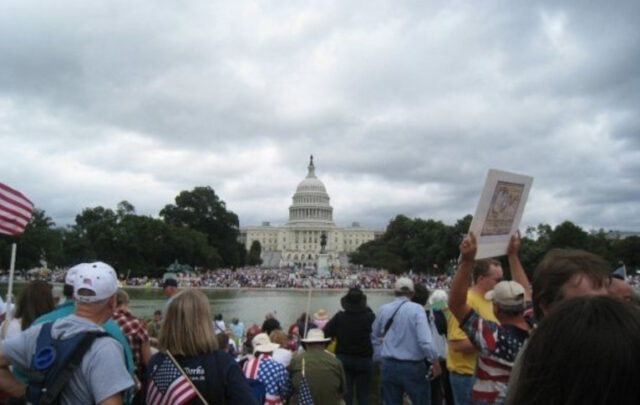In a world where states have been able to disguise their intentions, Jeremy Fox examines the implications of technological advancements on the necessary transparency that governments need to address.
We live an age of grievance and disillusionment. Manifestations of discontent have been erupting all over the globe like outbreaks of a fever. In recent times we have witnessed mass protests in London, New York, in Rio and São Paulo and other Brazilian cities, in Istanbul, Algiers, Madrid, Athens, Cairo, Sofia, Rome: protests against political incompetence, broken promises, the growing gap between rich and poor, the greed of bankers and corporate moguls, and the unholy alliance between these and the people who govern us. At an extreme level, we have seen governments overthrown in Tunisia, Libya and Egypt, and a civil war in Syria that shows little sign of concluding. Egyptians are in the streets again.
What is going on?
One possible answer to these events, is that we are collectively experiencing one of the less savoury effects of globalisation in the Western neo-liberal version that has so captivated much of the world. Economic downturns are no longer merely a national problem. A slump in the US or European markets can put people who live ten thousand miles away out of work. Sub-prime loans and clever schemes for disguising them have brought more than a few banks to the edge of ruin (and one or two over the edge) regardless of where they are or were headquartered. More importantly, people of many different countries have paid a heavy price for banking profligacy – and will likely continue paying for many years. Cuts in public services – or a failure to invest in them – figure among the complaints of Brazilians as well as Britons; home repossessions have become a frighteningly familiar phenomenon in Spain as well as in the United States. What we have seen is the delivery of whole populations to the vagaries of the international market, the rapacity of financiers, and the careless cruelties of incompetent governments.
Globalization has achieved something else, however, that can only be uncomfortable to governing elites, namely the capacity for people to share experience and to communicate with each other instantaneously and over long distances. Much like the weather, a disturbance in one country can cross oceans and reappear on the far side of the globe. Anger and disaffection are no longer constrained by frontiers. We are becoming as knowledgable and sometimes even as indignant about injustice in distant lands as in our own back yard. People are discovering that they have more in common with the protesters of Tahrir, Taksim, Wall Street and Avenida Presidente Vargas than with their own politicians, who increasingly convey an impression of belonging to a perverse offshoot of the human species: one that is remote, immune to economic distress, morally if not legally corrupt in its intimacy with wealth and the wealthy, and concerned about the cares of the rest of us only insofar as there is political advantage in seeming so.
One reflection of the growing distance between governors and the governed may be observed in the recent eruption into the headlines of Bradley Manning, Julian Assange and Ed Snowden: the first of these currently being tried for a litany of horrendous lèse- majesté offences, the second holed up in the Ecuadorean embassy in London, and the third seeking sanctuary from the US Authorities. Their offences: informing the people of the illegal and morally repugnant activities of the US Government and its allies, of which the UK is a salient member. These activities are not simply in defence of the citizenry, nor directed specifically at criminals or terrorists or hostile and undemocratic regimes. They are aimed at all of us, individuals and governments alike, without the knowledge or consent of either.
In constitution-less UK, no foolproof protection exists against whatever our political leaders wish to do on our behalf. We have only the demonstrably unreliable words of ministers and their minions that although they are defending our interests and our lives, we shouldn’t know how they are going about it. Many of them are the same career politicians who were gung-ho for the Iraq War and who happily waved our soldiers into Afghanistan on a peace and stability mission. US citizens do have a constitution that supposedly safeguards them against the abuses of government; but in matters of surveillance and secrecy, the relevant clauses seem to have been whited out.
The crimes of Assange, Manning and Snowden are to have revealed to the public that the sanctimonious image of Western democracy propagandised round the world is seriously misleading. Whether or not Manning and Snowden are, as they would claim, defenders of the US constitution, all three men have unarguably defended the people’s right to know what is being done in their name. Yet they are branded as traitors in the twisted logic of those for whom constitutional protections and civil and human rights have become mere impediments to action. No one has conducted an opinion poll of international public reaction to the hounding of Bradley Manning, Julian Assange and Ed Snowden, but it’s a good bet that all three would command a majority of support in most countries if not in the United States.
A triumvirate of corporate executives, financiers and politicians has demonstrated what a glance at history unfailingly reaffirms, namely that democracy – the voice of the people – is invariably distasteful to political elites even when by election they appear to be its beneficiaries. Jefferson made this observation repeatedly. Patrick Henry, another US Founding Father, spotted the danger inherent in government secrecy when he noted that: “The liberties of a people never were, nor ever will be, secure, when the transactions of their rulers may be concealed from them”.
Regrettably, exposure of unpleasant secrets does not alone provoke in our leaders either remorse or a desire for change. When skullduggery becomes public – as it has done repeatedly with Abu Ghraib, Guantanamo, Extraordinary Rendition, collusion in torture, spying on allies, and so on – politicians defend it on the grounds of public interest, or more specifically to protect us from the activities of terrorists, or maybe just because that’s what governments do.
There is a curiously unpleasant precedent to this kind of grubby justification. After the German Reichstag erupted in flames in 1933, Hitler’s used the occasion to announce his War on Terror and to push through legislation – the "Decree on the Protection of People and the State" – that allowed the police to intercept mail, wiretap phones and imprison terrorism suspects without charge. References to "The Fatherland" began cropping up in Hitler’s speeches and, before long, an Office of Homeland (Fatherland) Security – the Reichssicherheitshauptamt came into being whose first head was that luminous defender of human rights, SS-Obergruppenfuhrer Reinhard Heydrich. It was apparently not too difficult to persuade a significant proportion of the German people that these initiatives were designed to protect them from the hostiles forces that were bent on destroying their way of life.
Disquiet over the undercover activities of public agencies is not, of course, the only cause of the increasing distance between governors and the governed. During the last UK election, members of the current Coalition assured the electorate that there would be no “top-down” reorganisation of the National Health Service, a promise that has proved as empty as President Obama’s that he would close down Guantanamo Bay. French and Dutch voters rejected The Treaty Establishing a European Constitution so the EU collective changed the title to the Lisbon Treaty, made a few amendments, and this time made sure not to consult the people. While the banks have done their best to ruin us, and their senior executives continue to pay themselves obscenely large sums, governments world-wide have made no significant attempt to introduce stricter controls over financial transactions.
Wedded as they are to a market-fundamentalist view of how to shape the administration of life, traditional parties have become irrelevant as foci of alternative visions. Before Labour leader Tony Blair came into office, he promised to stick to the spending plans of the previous government. Ed Miliband, the current Labour leader, has just delivered the same message. US presidents regardless of Party stick to the same neo-liberal ideology and to the same projection of US power overseas. Right now the Obama administration is wagging an authoritarian finger at China and Russia over their refusal to send Snowden back home (finger-wagger John Kerry has not yet understood that foreigners no longer genuflect before US Secretaries of State, still less fear their admonishments). These are examples from the Anglo-Saxon world, but readers in other countries will recognise the behaviour in their own political landscape. It can be summarised as disdain for public opinion and for the openness and honesty without which democracy becomes little more than a slogan.
Among world leaders, an unusual figure appears from time to time to remind us that alternatives do exist. Pepe Mujica, President of Uruguay is one. He donates most of his salary to the poor, and recently opened some rooms of the presidential palace as a temporary shelter for the homeless. He has acquired a deserved reputation as the world’s poorest president. He is probably the only national leader whose word I would unhesitatingly trust. There are lessons to be learned from the behaviour of leaders such as Mujica, but it’s unlikely that any politician in Europe or North America would be willing to heed them. I remember a conversation with a senior Foreign Office mandarin when Evo Morales, then president-elect of Bolivia and the first indigenous president of any South American country made a brief visit to Europe. I asked whether Tony Blair would be inviting Morales to Downing Street.
“Oh no,” came the reply, “Blair only meets with important people.”
“Like who?”
“Oh, leaders of major countries, presidents of multinational companies. Bolivia’s too small for him.”






